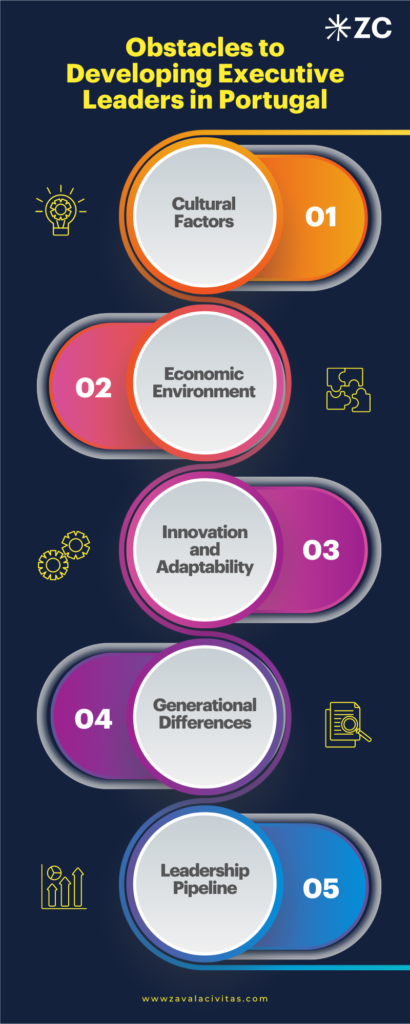The significance of effective leadership in today’s fast-changing business environment cannot be overemphasized. In Portugal, companies that are not investing in Executive Leadership Development are at a competitive disadvantage. This article explores the peculiar challenges encountered while developing leadership within Portuguese organizations and outlines why such development is vital for organizational and economic success.
Obstacles to Developing Leaders in Portugal

- Cultural Factors:
Portuguese business culture mostly emphasizes hierarchy and respect for authority which may stifle open communication and innovation. For instance, this hierarchy structure may impede the growth of leadership styles that encourage collaboration as well as creativity. Moreover, there is an inclination by the people towards risk aversion which discourages leaders from engaging bold or transformative strategies necessary for making headway in a highly competitive global market.
- Economic Environment:
Executive Leadership Development programs often suffer due to financial constraints. During tough economic times, training and development budgets can be slashed by companies who see them as less important. Furthermore, small and medium-sized businesses (SMEs) prevail in the Portuguese economy thereby lacking capacity required to establish successful leadership initiatives.
3.Innovation and Adaptability:
Resistance to change hampers growth greatly because both employees and leaders may sometimes refuse new practices on management or even any other forms of managing such developments among themselves. These technological advancements have thus made adaptability as one of the most demanded characteristics of a leader which necessitates them being digitally literate/tech-savvy hence putting digital literacy and innovation into leadership programs becomes necessary albeit complicated.
4.Generational Differences:
Different generations come with diverse expectations and approaches to work and leadership. Creating programs that meet generational diversity needs and perspectives, though challenging, is a prerequisite for unity in leadership as well as management.
5.Leadership Pipeline:
Identifying potential leaders within an organization and nurturing them is often a difficult task. The recognition as well as development of high potential employees necessitates effective talent management strategies. Further, retaining talented individuals is essential for successful Executive Leadership Development since a high rate of staff turnover can lead to disruptions in efficacy and continuity.
7.Global Competitiveness:
Portuguese companies must have leaders who know global trends and can deal with cross-cultural issues so that they can compete on international markets. This entails focusing on global awareness, cross-cultural competencies and strategic thinking in Executive Leadership Development programs.
8.Regulatory and Policy Environment:
Portugal has a complex regulatory environment which includes navigating through red tape which can be time consuming. As such, compliance with local laws and regulations should form part of the curriculum used in these programs while also ensuring their innovativeness.
The Importance of Executive Leadership Development to Portugal
1.Enhancing Organizational Performance:
Effective leadership training equips leaders with skills required for making informed decisions as well as strategic planning thereby promoting organizational performance. Equally it leads to increased productivity because leaders become more adept at managing teams, motivating employees or even optimizing processes themselves.
2.Driving Innovation and Competitiveness:
Leadership training fosters innovation culture by teaching managers how to think outside the box or embrace new technological advancements. Another impact relates towards enhancing global competitiveness whose outcome would be preparing future leaders for understanding world trend patterns hence enabling them overcome culture differences associated with business ties across borders.
3.Adaptation to Change:
Raising leaders that can guide the firm through economic vicissitudes and seize opportunities is essential. Thus, for digital transformation to become a reality, there is need for managers who are flexible enough to keep up with technological changes while integrating new digital tools into their day-to-day activities.
4.Talent Retention and Employee Engagement:
Executive Leadership Development investment communicates the company’s commitment towards employee growth and career advancement hence reducing turnover by enhancing job satisfaction. Effective leadership serves as a means of creating an engaged and committed workforce which in turn leads to better overall performance.
5.Succession Planning: This helps in identifying and grooming future leaders to make smooth transitions possible aside from maintaining continuities in leadership positions, it also mitigates risks associated with abrupt exits or leadership gaps.
6.Cultural and Social Impact: It is crucial for organization heads to be responsible for shaping organizational culture. Effective Executive Leadership Development contributes to positive workplace environments with inclusion being at its epicenter thereby fostering productivity within staff members. Furthermore, leaders anchored by strong ethical principles are more likely to implement corporate social responsibility initiatives that benefit communities while boosting the reputation of their companies.
7.Economic Growth and Development: Strong company-level governance leads to increased national economic performance as it enables business success, boosts innovation and creates jobs. The other aspect of Executive Leadership Development involves providing the necessary skills that could lead young men and women into becoming entrepreneurs hence promoting establishment of start-ups thus contributing into an active economy.
8.Regulatory and Compliance Excellence: Knowledgeable company executives ensure compliance with local and international laws thus averting legal issues plus potential fines charged against them for noncompliance. In addition, ethical leaders contribute positively on keeping integrity standards high; thereby directing good corporate governance behavior.
In conclusion, Executive Leadership Development challenges in Portugal are multifold encompassing cultural influences, economic factors, educational trends and generational gaps among others. Nevertheless, these challenges should not be underestimated. Effective
Executive Leadership Development is pivotal in improving organizational performance, driving innovation, ensuring adaptability, retaining talent and contributing to economic growth. This can be achieved through customized development programs that would target leadership in Portugal given the country’s vibrant business environment.
Also you can read about executive search approaches in Portugal here.









